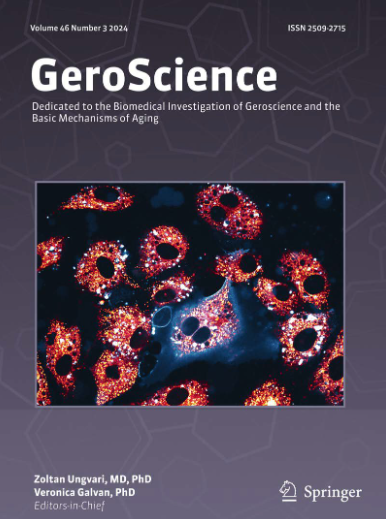rTMS modulates early AD progression via synergistic brain network reorganization and peripheral biomarker dynamics.
IF 5.4
2区 医学
Q1 GERIATRICS & GERONTOLOGY
引用次数: 0
Abstract
Repetitive transcranial magnetic stimulation (rTMS) improves cognition in Alzheimer's disease (AD), yet its biomarker and neuroplasticity effects remain unclear. Cognitive scale scores, plasma biomarker levels, and resting-state fMRI brain network in AD patients were analyzed before and after a 14-day 20 Hz rTMS intervention. The results demonstrated that rTMS intervention significantly improved cognitive performance (MMSE: Z = - 2.863, q = 0.017; MoCA: t = - 6.137, q < 0.001; RAVLT_I: t = - 3.436, q = 0.011) and reduced neuropsychiatric symptoms (NPI: Z = - 2.547, q = 0.037; HAMD: Z = - 3.472, q = 0.009). A 9.4% reduction in neurofilament light chain levels was demonstrated (Z = - 2.371, P = 0.018), with baseline p-Tau181 levels being inversely correlated to Aβ42 changes (R = - 0.428, P = 0.033). Enhanced global efficiency (GE: t = - 1.865, P = 0.081, r = 0.423) and increased connection density (CD: Z = - 1.823, P = 0.068, r = 0.442) were identified in neural networks. Notably, GE improvements positively correlated with elevated Aβ42/40 (R = 0.596, P = 0.025), while cognitive gains measured by the MoCA were significantly associated with network reorganization metrics (GE: R = 0.486, P = 0.048; CD: R = 0.514, P = 0.035). rTMS demonstrates potential in mitigating neurodegeneration by enhancing brain network integration and modulating Aβ metabolism. This effect was particularly pronounced in early-stage AD patients who exhibit preserved neural integrity. These findings advance therapeutic assessment frameworks and decode TMS neuromodulation mechanisms. The trial was prospectively registered (ChiCTR2400080657, ClinicalTrials.gov; 2024-02-04).rTMS通过协同脑网络重组和外周生物标志物动力学调节早期AD进展。
重复经颅磁刺激(rTMS)改善阿尔茨海默病(AD)的认知,但其生物标志物和神经可塑性效应尚不清楚。对AD患者进行为期14天的20hz rTMS干预前后的认知量表评分、血浆生物标志物水平和静息状态fMRI脑网络进行分析。结果表明,rTMS干预显著改善了认知能力(MMSE: Z = - 2.863, q = 0.017; MoCA: t = - 6.137, q < 0.001; RAVLT_I: t = - 3.436, q = 0.011),减轻了神经精神症状(NPI: Z = - 2.547, q = 0.037; HAMD: Z = - 3.472, q = 0.009)。神经丝轻链水平下降9.4% (Z = - 2.371, P = 0.018),基线P - tau181水平与A - β42变化呈负相关(R = - 0.428, P = 0.033)。神经网络的整体效率(GE: t = - 1.865, P = 0.081, r = 0.423)和连接密度(CD: Z = - 1.823, P = 0.068, r = 0.442)均有所提高。值得注意的是,GE改善与Aβ42/40升高呈正相关(R = 0.596, P = 0.025),而MoCA测量的认知收益与网络重组指标显著相关(GE: R = 0.486, P = 0.048; CD: R = 0.514, P = 0.035)。rTMS通过增强脑网络整合和调节Aβ代谢来缓解神经退行性变。这种效果在神经完整性保存完好的早期AD患者中尤为明显。这些发现推进了治疗评估框架,并解码了经颅磁刺激神经调节机制。该试验已前瞻性注册(ChiCTR2400080657, ClinicalTrials.gov; 24-02-04)。
本文章由计算机程序翻译,如有差异,请以英文原文为准。
求助全文
约1分钟内获得全文
求助全文
来源期刊

GeroScience
Medicine-Complementary and Alternative Medicine
CiteScore
10.50
自引率
5.40%
发文量
182
期刊介绍:
GeroScience is a bi-monthly, international, peer-reviewed journal that publishes articles related to research in the biology of aging and research on biomedical applications that impact aging. The scope of articles to be considered include evolutionary biology, biophysics, genetics, genomics, proteomics, molecular biology, cell biology, biochemistry, endocrinology, immunology, physiology, pharmacology, neuroscience, and psychology.
 求助内容:
求助内容: 应助结果提醒方式:
应助结果提醒方式:


